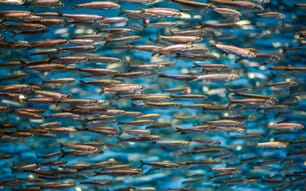The report, Enabling Sustainability through Engagement and Advocacy, also emphasizes efforts to encourage industry engagement, including efforts by ISSF participating companies to comply with ISSF conservation measures and commitments.
“They say any goal that’s easy to achieve isn’t worth achieving. By this standard, ISSF’s goal of ensuring the long-term health and sustainability of global tuna stocks is indeed a worthy one. And we are committed to achieving it – through collaborative approaches among engaged stakeholders that lead to continuous improvement across tuna fisheries around the globe,” said ISSF President Susan Jackson.
“ISSF’s mission is dependent upon the support and actions of many. While the group of stakeholders engaged on issues of tuna sustainability is broad and diverse, our many common goals make working together not only possible, but essential.”
When ISSF created its five-year Strategic Plan last year, it began with a comprehensive planning process to define the role of the organization in the global sustainability community and how best to drive meaningful, practical, and implementable progress. ISSF engaged with stakeholders across the spectrum of experts, including environmental groups, government leaders, tuna processors and more to determine the way forward. The result is three core pillars that guide ISSF’s execution of its strategy:
1. Achieve sustainability of tuna stocks and their ecosystems through continuous improvement – measurably demonstrated – across global tuna fisheries.
2. Maintain and enhance credibility through improved transparency and compliance related to all ISSF and participating company commitments – as well as all initiatives directly supported by ISSF.
3. Exercise market and policy influence in regions and fisheries where participating companies operate and harvest tuna to directly and positively impact the goal of tuna stock and ecosystem sustainability through market influence and RFMO institutional and member advocacy.
“Moving forward, ISSF will focus more than ever on utilizing science-based approaches to advance tuna stock sustainability that are both implementable by key stakeholders and that evolve as new best practices are defined. ISSF will advocate for these approaches, encouraging stakeholders to play a role in the continuous improvement of tuna fisheries that best suit their abilities and perspective,” said ISSF Chairman Juan Corrales.
“We collaborate with those from all fields and backgrounds who are committed to working together to ensure the long-term sustainability of global tuna stocks and their ecosystem.”
Although ISSF notes that national governments and regional bodies have much work to do, Regional Fisheries Management Organizations (RFMOs) have come a long way in the past several years as ISSF highlights in the report’s section on advocacy.
Among important accomplishments made by RFMOs in 2013 for which ISSF, our partners and engaged stakeholders have advocated for include:
Indian Ocean Tuna Commission (IOTC)
· Resolution requiring collection of specific FAD data (effective 2015)
· Recommendation for use of non-entangling FAD designs (effective 2014)
· Requirement that vessels larger than 24 meters have an International Maritime Organization (IMO) number (effective 2015)
· Resolution prohibiting retention of oceanic white-tip sharks and the intentional setting of purse seine nets around cetaceans (effective immediately)
· Resolution setting interim biological reference points and a work plan for developing harvest control rules
Inter-American Tropical Tuna Commission (IATTC)
· Resolution requiring collection of specific FAD data (effective 2015)
· Recommendation for use of non-entangling FAD designs (effective immediately)
· Agreement to hold Target Capacity Workshop in 2014
International Commission for the Conservation of Atlantic Tunas (ICCAT)
· Resolution requiring collection of specific FAD data (effective 2014 for developed States; 1 January 2015 for developing States)
· Recommendation encouraging use of non-entangling FAD designs (effective immediately)
· Requirement that vessels larger than 20 meters have an IMO number (effective 2016)
Western and Central Pacific Fisheries Commission (WCPFC)
· Establishment of provisions for FAD closures and FAD set limits
· Resolution prohibiting retention of silky sharks (effective 1 July 2014)
· Requirement that vessels at least 100 GT or 100 GRT in size have an IMO number or LR numbers issued to them (effective 1 January 2016)
· Capacity freezes for developed State flagged large-scale purse and longline fishing vessels (with freezing capacity)
· Establishment of provisions for the development of a scheme to reduce overcapacity without constraining developing coastal States, and the transfer of capacity from developed to developing coastal States including market-based mechanisms for the voluntary transfer
· Provisions for the development of a scheme to jointly reduce capacity of large-scale purse seine vessels to the level of 31 December 2012
ISSF will issue an annual report every year to notify the global seafood sustainability community of its collective progress, future goals, and how the organization seeks to accomplish them.



